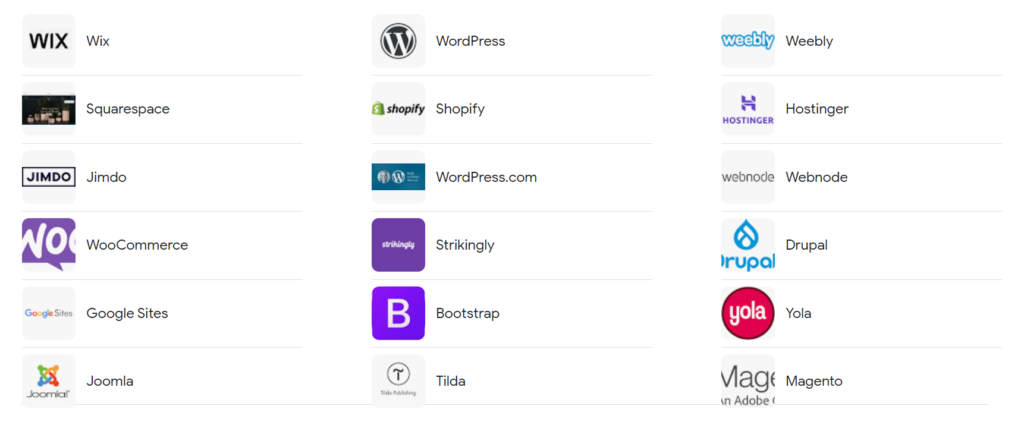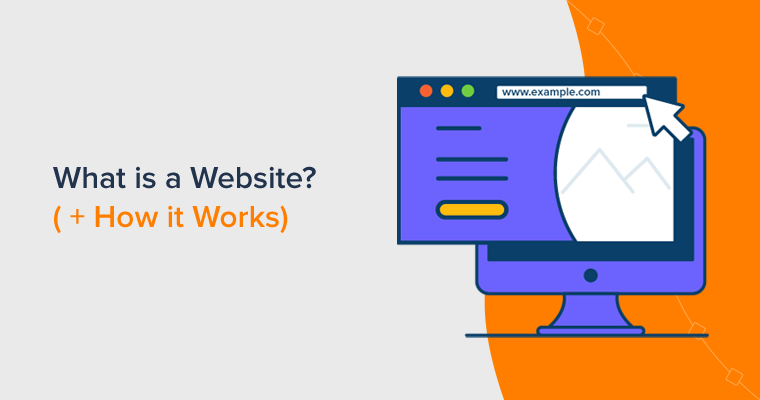What is a website?
Before we get into how a website works, let’s first define what a website is.
A website is a collection of interlinked web pages accessed via the Internet. It delivers information, entertainment, or services to users through a web browser on computers or mobile devices.
These webpages contain and display information about the business or organization and are usually made up of elements such as photos, videos and text.
Users need a device with a web browser — laptops, smartphones or tablets — and an Internet connection to access a website.
Once users have those, they can type the website’s address on the address bar of the device’s web browser to access the website.
How does a website work?
Now that you know what a website is, let’s look at how a website actually works.
Once a visitor types your domain name into their browser’s address bar, their computer sends a request to connect to the webserver keeping your files. Before reaching the web server, the request passes through the DNS, which looks up the server’s IP address.
For more information, check out our video tutorial on how websites work.
Why websites are used for?
Before we learn how websites work, let’s explore what websites are used for. Websites are built for different purposes or goals.
Some reasons for creating a functional website include:
- Providing information: Multiple websites exist to provide information. For example, government and business websites inform visitors of updates in their respective offices or companies, while news websites update users on the latest happenings around the world.
- Entertaining: Websites such as YouTube and Netflix allow you to watch movies and shows, listen to music or play games.
- Interacting with other users: Social networking sites and forums allow users to connect, communicate and share ideas.
- Buying and selling items: E-commerce websites like Amazon and eBay allow users to sell and purchase items online.
- Showcasing work: Personal and portfolio websites are sites created to demonstrate a person’s ability by collecting and showing past projects they’ve worked on for future clients.
What you need to start a website
You have read about how a website works and the types of websites. Now let’s look at what we might need to start a website. That way, you’ll have a better understanding of How websites work.
To start a website, you will need the following:
1. A Website-Building Platform
Websites are made of a set of code or programming languages. The most common languages used to build websites are:
- Hypertext Markup Language (HTML) helps browsers display webpage elements such as text, links and media.
- Cascading Style Sheets (CSS) define webpage styles such as colors, layouts and fonts.
- Hypertext Preprocessor (PHP) is the programming language used to create dynamic and interactive websites. PHP is responsible for retrieving content from databases and displaying them on your website. With PHP, you can create login pages, forms and galleries.
- JavaScript allows you to implement complex features to your website. Anytime your website does more than display static information, JavaScript is probably involved.
Nowadays, you don’t have to build websites straight from code. Content management systems (CMS) such as WordPress allow you to access websites and build a website easily.
These platforms use code but do not require users to have developer-level coding skills to use them.

2. Web Hosting Provider
Websites are made up of different files needed to display your content online. How would you get these files from your computer to other pages on the Internet — and where would you store them?
The answer — web servers and web hosting services.
After choosing a platform to build your website, you’ll need a web host, which serves and stores your website files on an online space called the webserver.
Your host transfers all http requests and the files needed to fulfill that request whenever someone visits your website. Web hosts also help you with backups, uptime and security maintenance.
Free website-building platforms such as WordPress often require you to sign up for web hosting services separately.
An advantage of using these free CMS is complete control over your website, which is good until you realize that you’re also responsible for the not-so-fun parts like website security and maintenance.
If you want a platform that takes care of everything from web page hosting to security, you can opt for an easy WordPress website builder like WonderSuite.

3. A Domain Name
Lastly, you’ll need a domain name to make your website work.
A domain name is the website name that users enter on the browser (i.e., Chrome, Firefox or Safari) when they visit your website.
Computers, servers, and other devices connected over the same Internet protocol are each assigned a unique string of numbers called the Internet protocol (IP) address.
Every time you access a website, your computer communicates to the website’s server through IP addresses. But because the IP address consists of multiple numbers, users would struggle to memorize which string of numbers belongs to a website.
Thus, the domain name system (DNS) was born.
The DNS is composed of multiple nameservers that look up the domain. You can think of the DNS as a large web address book where computers can look up domain names and match them to their corresponding IP address.
You can sign up for a domain name via domain name registrars or get one for free when you sign up for a web hosting plan.
Why You Need a Website
If you don’t have a website yet, this is your sign to get one.
There are currently over 4.66 billion Internet users, which means more than half of the world’s population relies on the Internet to communicate, research, do business and a whole lot more.
Whether you’re a freelancer or a small business, here are a few reasons why you’ll benefit from a website:
- You’ll attract more customers and clients. 90% of customers start the buying process with a search. If you want to attract more customers, one of the best ways is by making yourself visible on Google.
- You can employ search engine optimization (SEO) methods to help your website rank organically.
- You’ll be competitive. The lockdowns imposed during the height of the 2020 pandemic required many businesses to shut down their brick-and-mortar stores, allowing many business owners to realize the importance of an online presence.
- According to the United Nations Trade and Development experts (UNCTAD), e-commerce is rising. It has always been in the future of retail; the pandemic only sped up its adoption.
- You’ll appear more credible. Customers will often check reviews and recommendations before doing business with a new company, with 50% of customers checking the company website.
Besides that, signing up for a business website allows you to create a branded email address using your company domain, letting you appear more professional.





